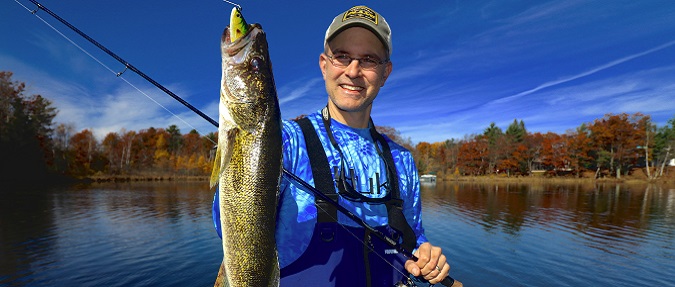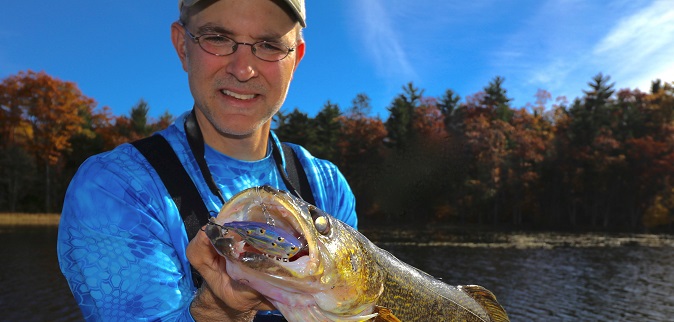
The signs of impending change are all around us. The last dry maple leaves are falling from the trees. Frost covers the windshield as the truck warms in the crisp morning air. Boat lifts and docks are high and dry, adorning the shorelines in anticipation of winter’s arrival.
This is also a time of change for walleyes in northern lakes and reservoirs, as they transition from the fall feeding buffet to typical winter habitat and activity levels. While their environment cools, walleyes must nevertheless continue to feed, both to sustain themselves through the winter and to develop their reproductive tissues that will be exercised during the spring spawning run. Savvy late fall anglers can enjoy walleye success until skim ice starts to encroach on the boat ramp, employing mobile presentations that focus on covering water and picking off active fish during late fall’s brief feeding windows.
Recognize that your favorite lake has two different types of high percentage, late fall walleye locations: steep breaks that lead toward deeper water, and mid-depth flats that still support green weed growth. These types of areas will be easy to identify using a combination of digital cartography, sonar and Aqua-Vu underwater cameras.
First, take a long look at your digital contour map: if the contour lines are packed together tightly in a small region that is several hundred feet offshore, and the water is 25-35 feet deep at the bottom of that sharp transition, then you have found a steep break that will likely have walleyes available. This break will be even more attractive if it has a hard bottom with scattered rock or gravel patches; these features will be quite prominent on your sonar view.
In clear lakes, mid-depth weed flats can be found in areas with widely spaced contour lines, ranging from 12-16 feet deep. While the weeds will be plainly visible on your sonar view, the easiest way to tell if those weeds are still green is to send the optics of an Aqua-Vu Micro II camera system into the depths. With its compact design, long-life lithium ion battery, and outstanding video color and clarity, the Aqua-Vu Micro II is an indispensable tool for identifying structure and fish, and for making a visual connection between an underwater object and its sonar return.

When targeting fish along steep breaks, present baits that remain in the walleye zone throughout the break’s entire depth range. One great option is a jig and soft plastic combination, like a 4” Moxi rigged on a ¼ oz Precision H20 Jig, both from B-Fish-N Tackle. An outstanding hard bait choice is the Yearling Rattlebait 75 from LIVETARGET Lures. Versatile, stout spinning gear, anchored by the St. Croix Legend Tournament Walleye “Snap Jig” rod (LTWS68MXF), is the perfect choice for either steep break presentation.
With the boat positioned over deep water, cast your selection to the shallow water at the top of the break. Work either bait along the entire depth range of the break, maintaining close bottom contact between the bait and the bottom. Early in the fall, you will be able to work baits down the break aggressively, using a snap-jigging retrieve; as water temperature plummet towards first ice, a slower, steady retrieve interrupted only by a few pauses will be more effective.
Mid-depth weed flats will hold a wide variety of gamefish throughout the fall and into the winter. While treble hook-adorned hardbaits will take their share of walleyes cruising the weeds, they are also prone to time-wasting snags as the bait dances among the weed-tops. A much more effect choice is a swimbait, like the hyper-realistic Yellow Perch Swimbait from LIVETARGET Lures. When presented with a long rod, like a 7 foot St. Croix Avid X casting rod (ACX70MF), this internally-weighted bait can be cast a country mile across the weed flat, allowing you to cover a lot of water from a single boat position. A slow, steady retrieve that keeps the bait among the weed-tops is all that is required for late fall weedbed success. Cast to the weeds with confidence, as the single hook of the LIVETARGET Yellow Perch Swimbait is ingeniously protected by the bait’s dorsal fin, ensuring a virtually snag-free retrieve as the bait works through the walleye-rich weedbed.
Your thoughts maybe turning to blaze orange and antlers, but take my advice and sneak in a couple of late fall walleye trips before you winterize the boat. While the water may be cold, the fishing can be hot, and memories of crisp fall days spent on the water will carry you through the coming months of staring down an eight-inch hole in the ice. Consider these hard (and soft!) strategies for late fall walleyes, and let’s hit the water…one last time!
Dr. Jason Halfen, The Technological Angler
